

Ethiopian Airlines will return to Changi Airport on 25 March 2023, with four weekly direct services between Singapore and Addis Ababa, the capital of Ethiopia. Addis Ababa is a unique city link for Changi Airport.
Ethiopian Airlines, awarded “Best Airline in Africa” for five consecutive years by SKYTRAX, will operate a 270-seat Boeing 787- 8 aircraft in a two-class configuration on the service, which will have a tag-on to and from Kuala Lumpur.


Before the pandemic, passenger traffic between Africa and Southeast Asia grew steadily between 2015 and 2019. More than 1.4 million passengers travelled between these two regions in 2019, an increase of 30% from 2015. Ethiopian Airlines last operated its passenger services to Changi Airport from June 2017 to March 2020. In 2019, Ethiopian Airlines contributed about 69,000 passenger movements to Changi Airport, a 3% increase from the preceding year. While it suspended its services due to the pandemic and border closures, it continued to operate ad-hoc Passenger Aircraft Carrying Cargo (PACC) services.
Trade and collaboration between Africa and Singapore have been expanding, and Africa is one of the world’s fastest growing regions. Investments from Singapore into Africa rose from US$17 billion to US$20 billion from 2015 to 20191. On the air cargo front, in the first ten months of 2022, airfreight carried between Singapore and Africa reached 83% of pre-Covid levels. Inbound cargo consists of semiconductor components, agriculture machinery parts and perishable goods such as food, while outbound cargo comprises mainly semiconductor goods.
Mr Mesfin Tasew, Ethiopian Airlines Group Chief Executive Officer said, “We are delighted to continue our service to Singapore, which was suspended in March 2020 due to the Covid-19 pandemic. The flight will further expand our network in Asia and create air connectivity for passengers travelling between Africa and Singapore. The new flight will also facilitate trade, investment, and tourism ties between Africa and Singapore. In line with our plan for growing our network around the world, we will keep on opening new routes to enhance connectivity between Africa and the rest of the world via Addis Ababa.”
Mr Lim Ching Kiat, CAG’s Executive Vice President of Air Hub Development, said, “We are thrilled to welcome Ethiopian Airlines to Changi Airport again. Ethiopian Airlines has been consistently voted as the Best Airline in Africa, and the network from its Addis Ababa hub connects with more than 60 destinations on the African continent. The flight between Singapore and Ethiopia will offer more travel options for passengers from our region to Africa. For many Singaporeans, Ethiopia could also be an exciting new vacation destination as it boasts many attractions ranging from historic sites such as Axum to breathtaking natural geography such as the Simien Mountains and Blue Nile falls.”
Changi Airport Group (CAG)’s sustainability strategy covers four main pillars, namely (i) carbon emissions reduction, (ii) waste management, (iii) water conservation, and (iv) climate resilience. The focus of this article will be on decarbonisation. CAG is committed to cutting carbon emissions while improving resource efficiency. The airport has pledged Zero Carbon Growth until 2030, even with the growing number of passengers that Changi Airport is expected to serve in the years ahead. We strive towards a Net Zero aspiration by 2050 through the use of new technologies, increased adoption of renewable energy and enabled by the progressive decarbonisation of the national power grid.
CAG’s efforts with the aviation industry to achieve Net Zero emissions by 2050
As an airport, Changi Airport forms the common platform upon which our aviation partners operate – from airlines, ground handlers, to airport tenants and concessionaires. Even though airports only contribute about 2% of global aviation emissions, CAG as a key role in reducing our airport’s emissions by optimising the energy consumption of our terminal buildings, and to engage the airport community in efforts to realise our shared goal of making air transport sustainable. Cleaner aircraft fuels, greener equipment for landside and airside activities, as well as to power our terminal buildings, are required. With our airport community, we focus on two broad thrusts:
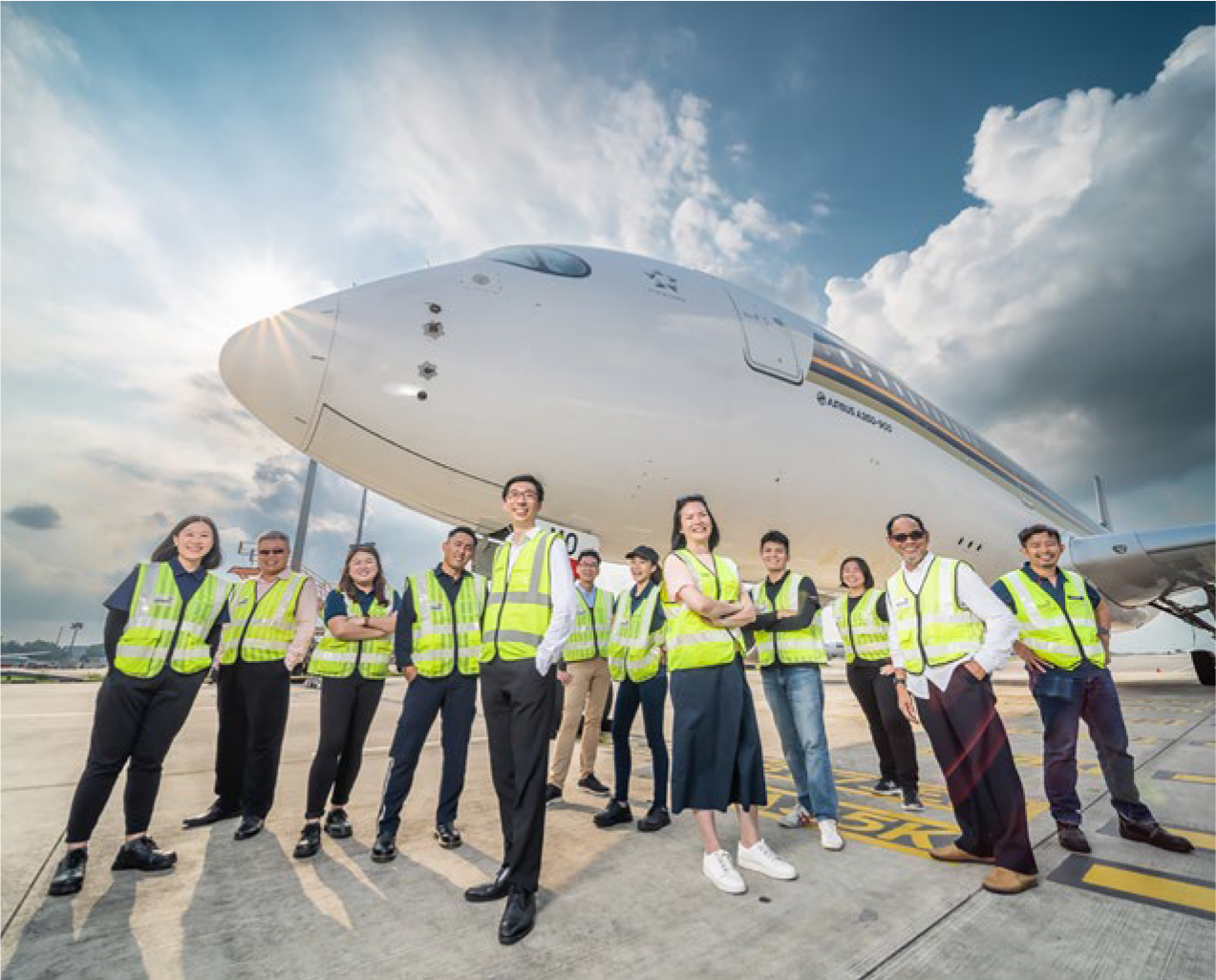
(i) Re-inventing how aviation stakeholders power their businesses and supporting airlines’ and ground handlers’ transition from fossil-based fuels
We closely engage with industry and regulatory partners and facilitate trials and studies on infrastructural needs to enable the adoption of Sustainable Aviation Fuel (SAF), renewable diesel and electric ground equipment. We have begun our transition with ground handling equipment such as baggage tractors being converted to electric variants, supported by the installation of a network of common use charging ports.
In the longer term, CAG together with the Civil Aviation Authority of Singapore (CAAS), Airbus and Linde, are studying the feasibility to potentially use hydrogen in aviation to power aircraft and operations at Changi Airport.
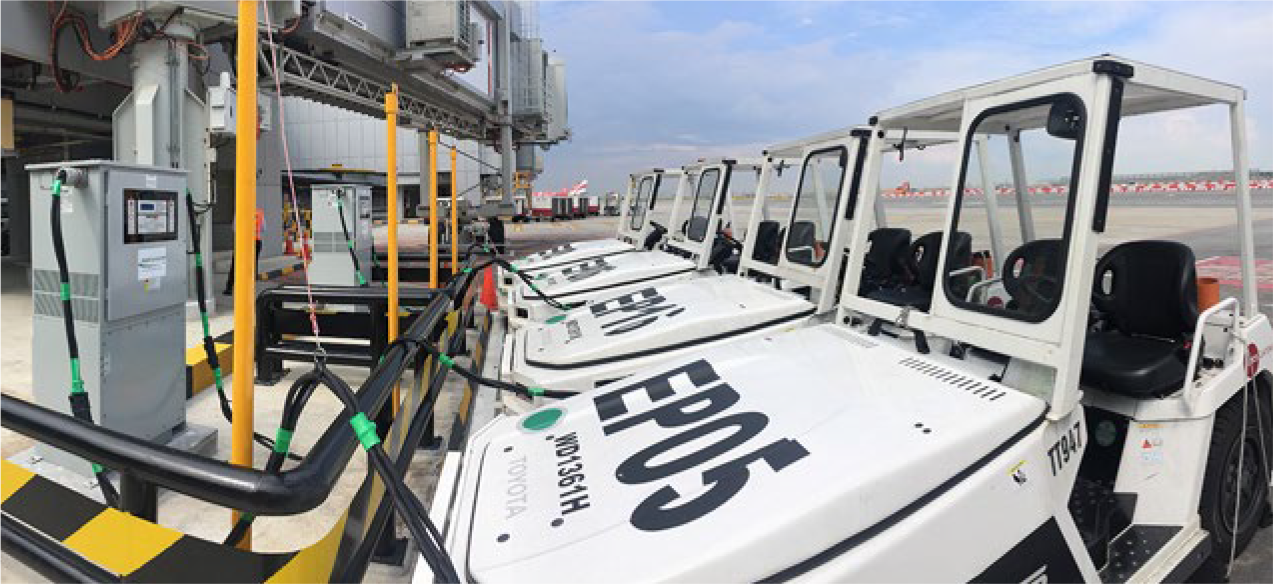
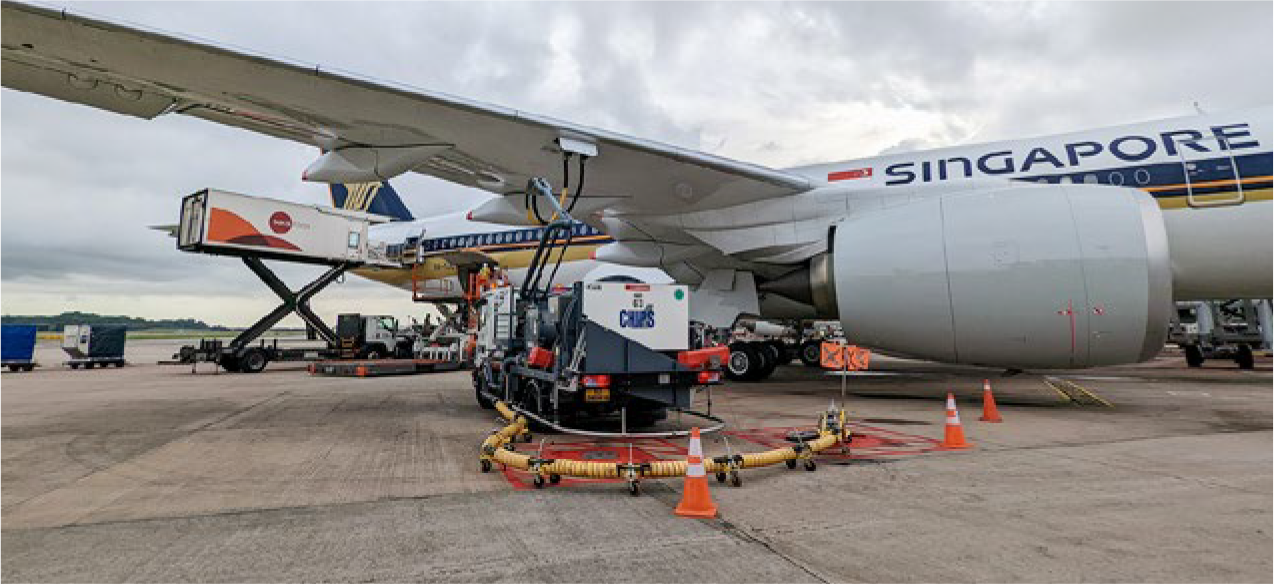
(ii) Re-inventing how the airport powers ourselves
Over 99% of CAG’s Scope 1 and Scope 2 emissions come from the use of electricity in operating our terminals. Hence, we focus on increasing our energy efficiencies through ensuring our infrastructure is upgraded to the best-in-class energy efficient models. We also aim to use more solar energy, and tap on potential renewable sources beyond the airport.
There are also similar efforts by our air cargo partners who have started trials on the usage of solar-powered equipment at their premises. For example, dnata has launched a 3.5 megawatt-peak rooftop solar power system across dnata’s cargo and catering facilities at Changi Airport.

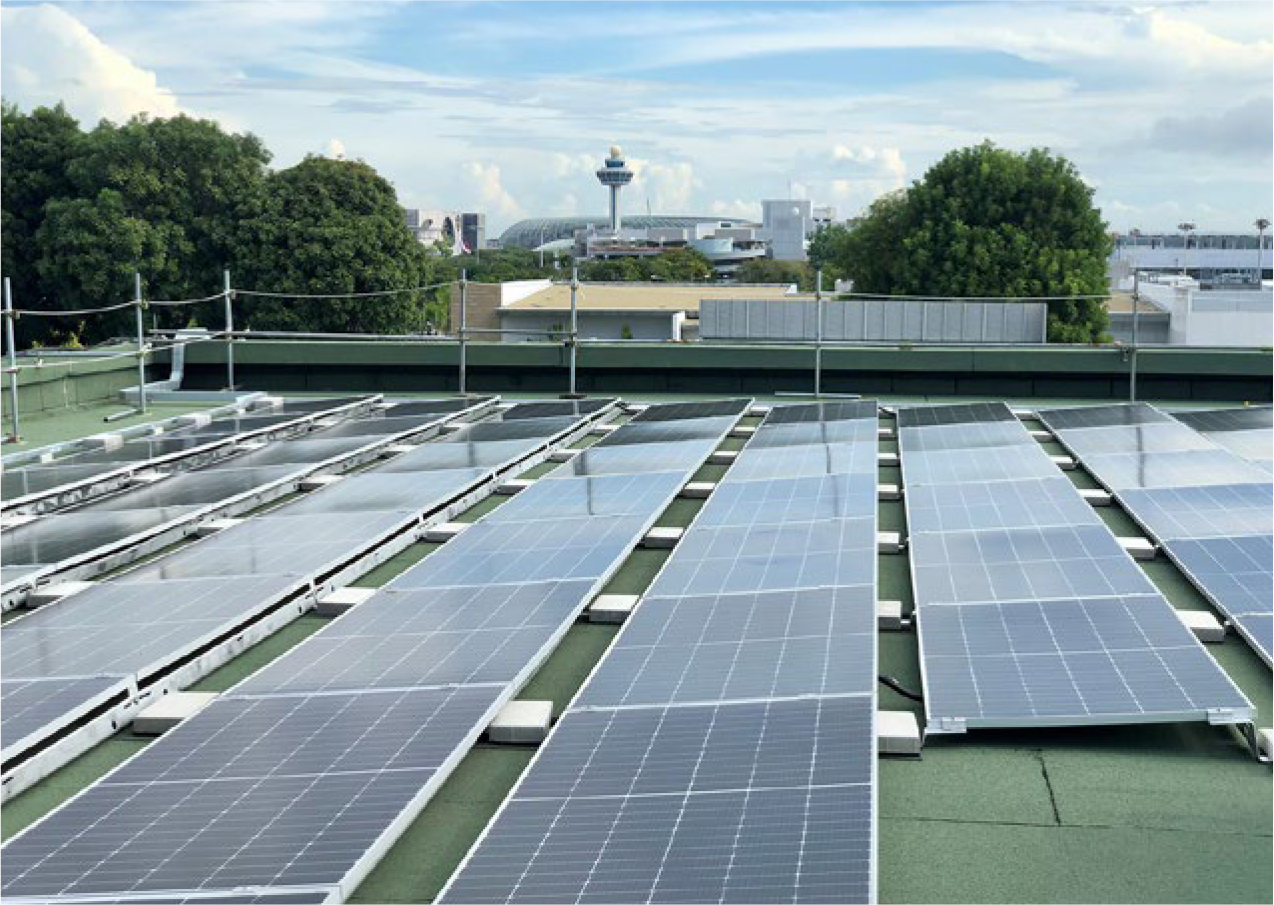
Specific to the cargo business, we are also facilitating closer industry collaboration through higher end-to-end supply chain visibility. We have put in place processes and protocols that could help improve the overall quality of the supply chain, which prevent degradation of products and reduce wastage. We have also launched initiatives to reduce carbon emissions. One such example is the Truck Dock Slot Booking (TDSB) application introduced under the Changi Air Cargo Community System (ACCS). By evening out cargo lodgment and collection at the air freight terminals, TDSB provides greater visibility to landside freight movement activities and lead to less truck waiting time, hence reducing carbon emissions.
CAG’s FY21/22 Sustainability Report
CAG has released its latest Sustainability Report, ‘Forging A Sustainable Changi’, which outlines CAG’s sustainability vision, approach and outcomes from the financial year ending 31 March 2022. The report covers CAG’s activities to build a sustainable Changi Airport with airport partners and the community to achieve Environmental, Social, and Governance goals. The full report can be found at https://www.changiairport.com/content/dam/cacorp/sustainability/sustainable-changi/sustainability-report/CAG%20Sustainability%20 Report%20FY2122.pdf
Since the start of the Truck Dock Slot Booking (TDSB) pilot trial in March 2021, 17 companies including the ground handlers dnata and SATS, freight forwarders, and trucking operators came together with Changi Airport Group (CAG) to embark on this digital transformation journey. The TDSB application aims to even out cargo lodging and collection to and from the cargo terminals at Changi Airfreight Centre, by improving ground efficiency through reduced truck waiting times, and enhancing landside visibility.
Throughout the 1.5 years since the TDSB pilot was implemented, CAG has worked closely with the members to collectively refine the TDSB booking process and platform user experience. The TDSB Pilot group came together regularly to provide feedback and observations with the aim of improving the operational process as well as enhancing user experience of the TDSB application. Several change management efforts and workshops and training had been conducted in the course of the TDSB pilot to increase their familiarity of TDSB and improve the overall adoption of this initiative.
We are pleased to update that the TDSB Pilot was successfully concluded on 30 September 2022. This could not have been done without the strong support of our pilot group.

As the pilot concluded, a feedback survey was conducted in September 2022 among the Ground Handlers, freight forwarders, and truck operators involved in the TDSB trial. Its objectives were to take stock of the TDSB pilot efforts and identify areas for further improvement.
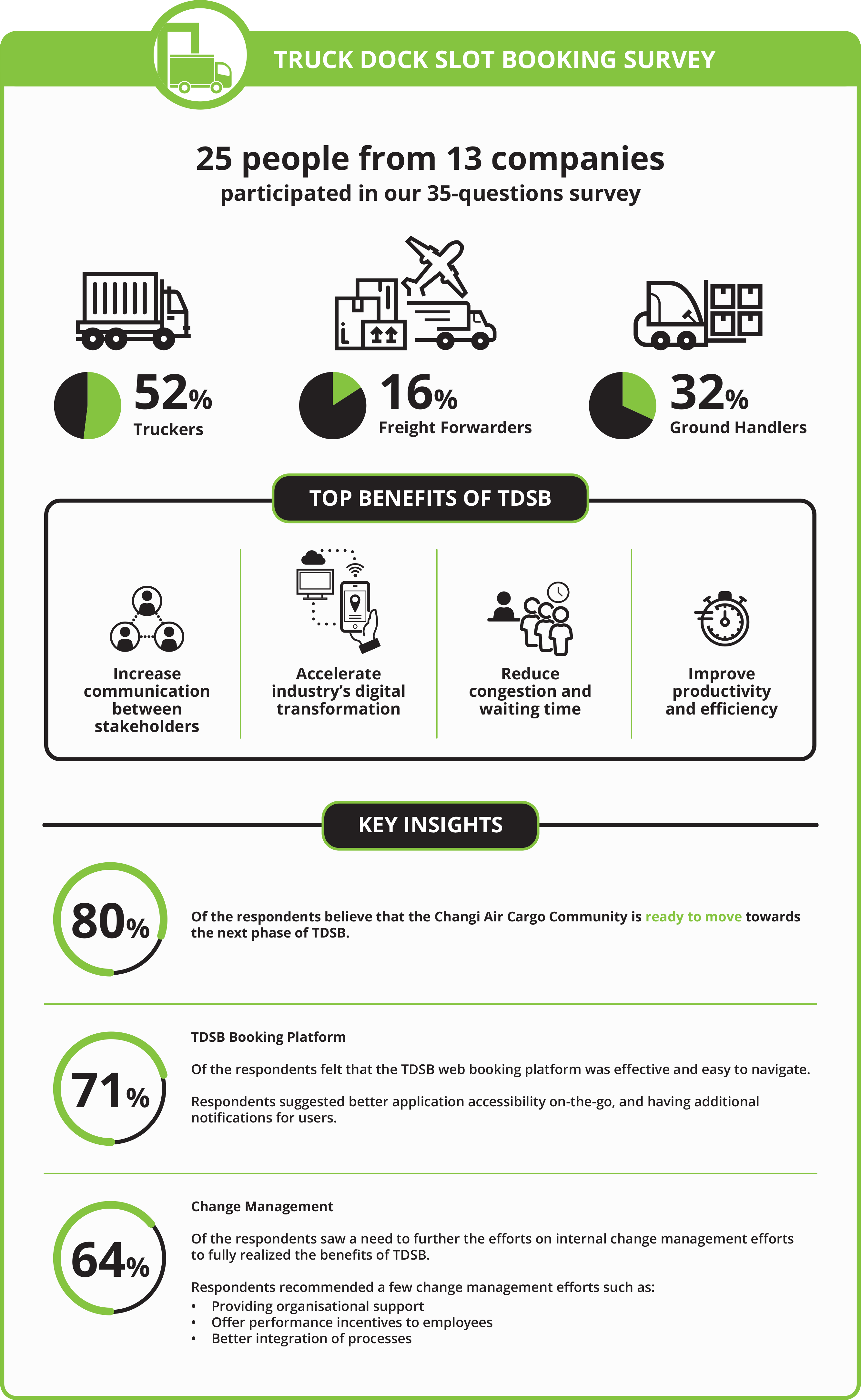
As we progress towards community-wide implementation in 2023, the TDSB process will be further refined to enhance the user experience and create greater value to its users. Details of the implementation phase of TDSB will be shared in early 2023.
We would like to thank all our TDSB pilot members for your commitment and efforts during the pilot. With your contribution, together we will build a more resilient Changi air cargo hub for the future!